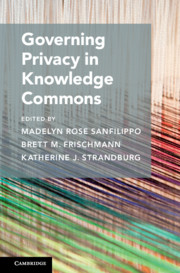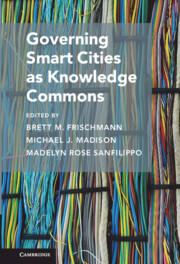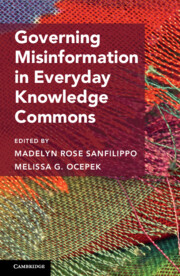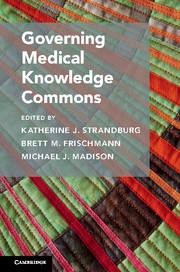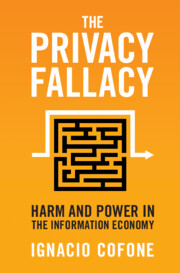Governing Privacy in Knowledge Commons
Governing Privacy in Knowledge Commons explores how privacy impacts knowledge production, community formation, and collaborative governance in diverse contexts, ranging from academia and IoT, to social media and mental health. Using nine new case studies and a meta-analysis of previous knowledge commons literature, the book integrates the Governing Knowledge Commons framework with Helen Nissenbaum's Contextual Integrity framework. The multidisciplinary case studies show that personal information is often a key component of the resources created by knowledge commons. Moreover, even when it is not the focus of the commons, personal information governance may require community participation and boundaries. Taken together, the chapters illustrate the importance of exit and voice in constructing and sustaining knowledge commons through appropriate personal information flows. They also shed light on the shortcomings of current notice-and-consent style regulation of social media platforms. This title is also available as Open Access on Cambridge Core.
- Expands and clarifies the Governing Knowledge Commons (GKC) framework to address privacy, legitimacy, exit, and voice
- Introduces the GKC theory using accessible explanations and examples
- Explores the parallels between the GKC framework and Contextual Integrity (CI) framework
Reviews & endorsements
‘Governing Privacy in Knowledge Commons is a fascinating collection of essays exploring how people negotiate privacy in various contexts within communities. The book deftly interweaves theory and specific examples. The editors have brought together a set of rich and nuanced contributions to understanding the social complexities of privacy.’ Daniel J. Solove, John Marshall Harlan Research Professor of Law, George Washington University Law School
‘This thought-provoking book is a must-read for anyone studying or interested in data cooperatives and data trusts. The marriage of the Governing Knowledge Commons framework with the theory of contextual integrity is a big win for privacy in the age of big data; this book advances the field considerably.’ Sue Glueck, Senior Director of Academic Relations, Microsoft
‘The increasing ability to record and store our actions, opinions, health data, images, etc. lead to important questions how to govern privacy. Governing Privacy in Knowledge Commons views privacy as a problem of collective action. This book provides a fresh perspective, applying the Institutional Analysis and Development framework of Elinor Ostrom, and the Governing Knowledge Commons framework of the editors to a diverse set of knowledge commons case studies.’ Marco Janssen, Arizona State University
Product details
March 2021Hardback
9781108485142
400 pages
236 × 158 × 22 mm
0.584kg
Available
Table of Contents
- Introduction
- 1. Personal information as a knowledge commons resources Madelyn Rose Sanfilippo, Brett Frischmann and Katherine J. Strandburg
- 2. How private individuals maintain privacy and govern their own health data cooperative: MIDATA in Switzerland Felix Gille and Effy Vayena
- 3. Pooling mental health data with Chatbots Michael Mattioli
- 4. Privacy in practice: a socio-technical integration research (STIR) study of rules-in-use within institutional research Kyle M. L. Jones and Chase McCoy
- 5. Public Facebook groups for political activism Madelyn Rose Sanfilippo and Katherine J. Strandburg
- 6. The republic of letters and the origins of scientific knowledge commons Michael J. Madison
- 7. Privacy and knowledge production across contexts Brett Frischmann, Katherine Haenschen and Ari Ezra Waldman
- 8. Governing the internet of everything Scott J. Shackelford
- 9. Contextual integrity as a gauge for governing knowledge commons Yan Shvartzshnaider, Madelyn Rose Sanfilippo and Noah Apthorpe
- 10. Designing for the privacy commons Darakhshan J. Mir
- Conclusion.

